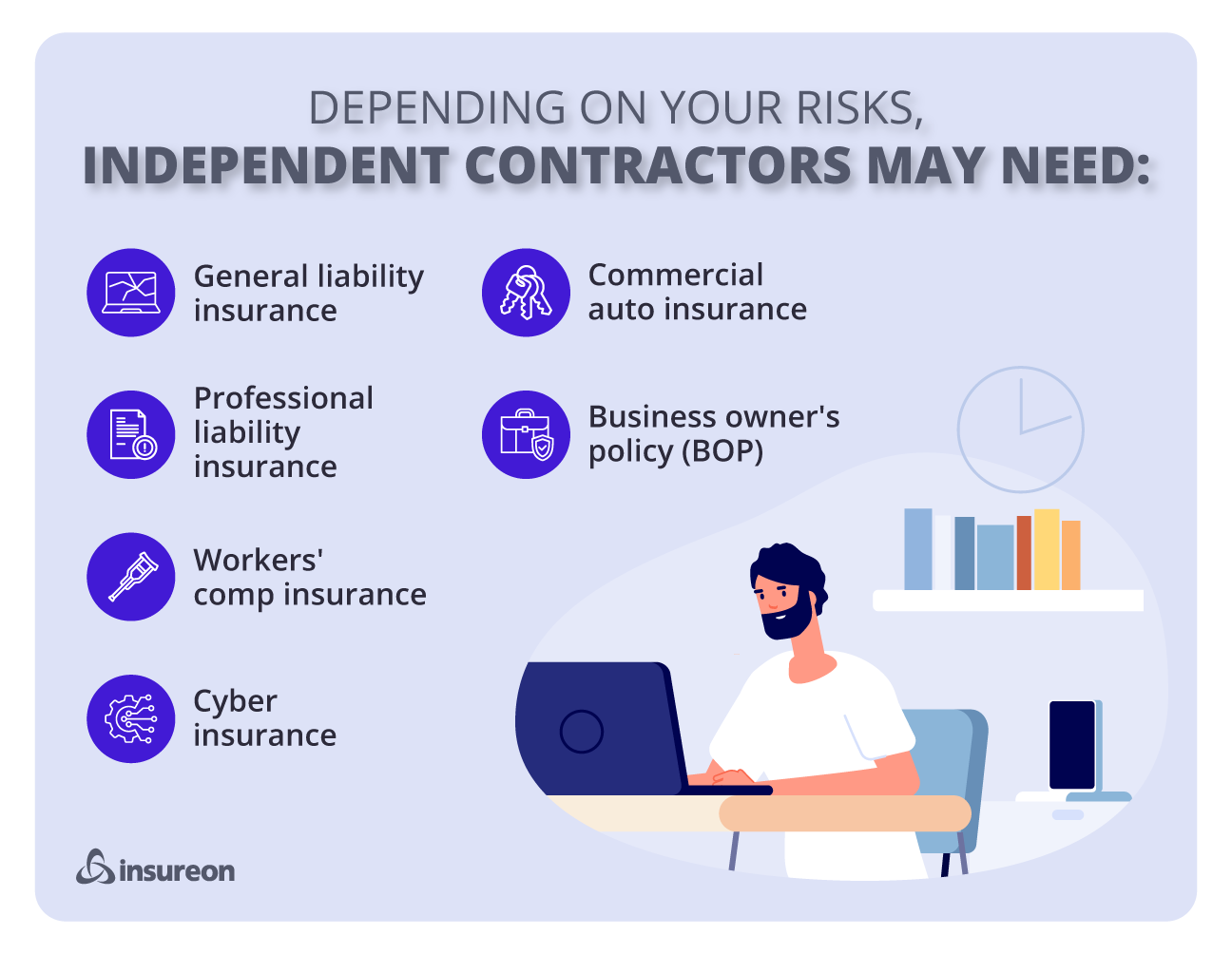
Why do independent contractors need business insurance?
Independent contractors face many of the same risks as larger businesses, but with less protection. Business insurance protects your personal assets and your business from legal fees, costly repairs, and medical expenses.
What types of insurance do independent contractors need?
These insurance policies cover common risks faced by 1099 contractors.
General liability insurance
General liability insurance covers the cost of third-party accidents, such as a client who trips and suffers a bodily injury at your office. It may be required for a commercial lease.
- Slip-and-fall accidents
- Accidents that damage client property
- Accidental copyright infringement
Professional liability insurance
This policy covers legal costs when an independent contractor makes a mistake that negatively affects a client. It's sometimes referred to as errors and omissions insurance (E&O).
- Mistakes that cause a client to lose money
- Missed deadlines
- Accusations of negligence
Workers’ compensation insurance
Workers’ compensation insurance shields independent contractors from work-related medical bills that health insurance might deny.
- Work-related medical expenses
- Disability benefits
- Lost income
Cyber insurance
Cyber insurance helps independent contractors recover financially from data breaches and cyberattacks. It's strongly recommended for any small business that stores personal information.
- Data breach notification costs
- Data breach investigations
- PR costs for reputational harm
Business owner's policy
A BOP bundles general liability coverage and commercial property insurance at a discount. It protects against the most common lawsuits and business property damage.
- Slip-and-fall injuries
- Accidents that damage client property
- Stolen or damaged business property
Commercial auto insurance
This policy covers costs when an independent contractor's business vehicle is involved in an accident. Each state has its own requirements for auto liability insurance.
- Auto accident injuries
- Property damage caused by your vehicle
- Vehicle theft and vandalism

How much does independent contractor insurance cost?

Independent contractors often qualify for discounts on business insurance. Factors that affect your premium include your profession, business location, and the policy's limits and deductible.
Here are the average costs for top insurance policies sold by Insureon:
General liability insurance: $42 per month
Professional liability: $61 per month
Workers' comp: $45 per month
Verified business insurance reviews
Hear from customers like you who purchased small business insurance.
State insurance requirements
Find business insurance requirements in your state

Get the right independent contractor business insurance
[video: an animated header displays the Insureon logo. Underneath it, a subheading displays the text: "What insurance coverage do independent contractors need?"]
MALE VOICEOVER: As an independent contractor, there are many perks you can enjoy like work flexibility and tax deductions. However, you aren't free from the risks larger businesses often face. With business insurance, you can safeguard your personal assets and your business from costly repairs, legal fees, and medical expenses. There are several insurance policies that provide sustained peace of mind and protect your business. Let's take a closer look at some top policies.
[video: an illustrated header displays the text: "General liability covers:"]
[video: Under above header, three bullet points display the text: "Slip-and-fall accidents"; "Client property damage"; "Product liability lawsuits"]
General liability insurance covers third-party accidents, such as customer injuries or property damage.
[video: an illustrated header displays the text: "Professional liability covers:"]
[video: Under above header, three bullet points display the text: "Accusations of negligence"; "Missed deadlines"; "Errors that cost clients clients money"]
Professional liability insurance, sometimes called errors and omissions coverage, will protect your business from lawsuits related to work mistakes and oversights.
[video: an illustrated header displays the text: "Workers' comp covers:"]
[video: Under above header, three bullet points display the text: "Work-related medical expenses"; "Disability benefits"; "Lawsuits from employee injuries"]
Workers' compensation insurance is required in most states and can shield you from work-related medical costs.
[video: an illustrated header displays the text: "Cyber insurance covers:"]
[video: Under above header, three bullet points display the text: "Data breach notification costs"; "Data breach investigations"; "PR costs for reputational harm"]
Cyber insurance can help your business financially recover from data breaches and cyber attacks.
[video: an illustrated header displays the text: "Commercial property covers:"]
[video: Under above header, three bullet points display the text: "Fires"; "Storm damage"; "Equipment theft"]
Commercial property insurance covers costs if your business property is damaged, destroyed, or stolen.
[video: an illustrated header displays the text: "A BOP covers:"]
[video: Under above header, three bullet points display the text: "Client accidents"; "Stolen or damaged property"; "Business interruptions"]
A business owner's policy or BOP bundles general liability and commercial property coverage together, and is usually less expensive than buying each of these policies individually.
[video: an illustrated header displays the text: "Commercial auto covers:"]
[video: Under above header, three bullet points display the text: "Auto accident injuries"; "Property damage caused by vehicles"; "Vehicle theft and vandalism"]
Commercial auto insurance protects your business from costs related to an auto accident involving your company vehicle.
[video: an illustrated header displays the text: "Fidelity bonds cover:"]
[video: Under above header, three bullet points display the text: "Employee theft or fraud"; "Illegal funds transfer by an employee"; "Client contract requirements"]
Fidelity bonds provide reimbursement to your client if an employee steals from them. These bonds are also sometimes required in contracts.
[video: an illustrated header displays the text: "Why is contractor insurance important?"]
So, why is it important for you to have insurance as an independent contractor?
[video: an illustrated header displays the text: "Contractors may need insurance to:"]
[video: Under above header, three bullet points display the text: "Sign a contract or lease"; "Apply for a loan"; "Comply with federal or state laws"]
You may need coverage to sign a contract or lease. You also might need insurance to comply with federal, state, or local laws.
[video: an illustrated header displays the text: "Insurance can also help:"]
[video: Under above header, three bullet points display the text: "During business closures"; "Gain client trust"; "Attract talent"]
Insurance also protects you from catastrophic losses that could stop your services. Plus, the right coverage can help you gain a client's trust.
Get the best coverage for your business with Insureon today.
[video: an illustrated white header displays the text: "Insureon is your #1 agency for small business insurance"]
Click the link to get started.
[video: an animated header displays the Insureon logo]
Common questions about insurance for independent contractors
Why is insurance important for independent contractors?
There are several important reasons for independent contractors, subcontractors, gig workers, and other self-employed individuals to carry insurance:
You may need insurance coverage to sign a contract or a lease. Clients and landlords may require you to carry insurance to protect themselves against potential losses. In some cases, they may ask you to list them as an additional insured on your policy.
You may need insurance to comply with the law. Depending on the laws in your state, you may need coverage for a business-owned vehicle, to obtain a license in your field, or to protect against work-related injuries.
You gain client trust by being insured. Even when it's not required, a certificate of insurance proves that your business can handle the cost of a lawsuit or accident. This helps attract clients and can give small business owners an edge over their competitors.
Insurance protects your business from catastrophic losses. Insurance helps your business withstand unexpected costs from customer accidents, fires, and other incidents that might otherwise prove devastating.
How do I get a certificate of insurance?
With Insureon, you can get usually get a certificate of insurance on the same day that you apply for quotes. It’s a simple three-step process:
- Fill out our easy online application.
- Compare free quotes from top-rated insurance providers.
- Buy a policy and download a certificate of insurance.
A certificate of insurance will outline all your coverage options, such as policy limits, deductibles, and any endorsements. It serves as proof of insurance for clients, landlords, lenders, and anyone else who asks whether your business is insured.
How can I save money on business insurance?
Insurance is usually affordable for 1099 contractors and low-risk small businesses. There are a few ways to find cheaper insurance:
Compare quotes. With Insureon, you will instantly get multiple free online quotes from leading insurance companies. Compare insurance options from different providers and consult with our agents to make sure you're not paying too much for insurance while getting what's best for your independent contractor business.
Bundle policies. Many small business owners buy general liability coverage and commercial property insurance together in a business owner's policy, which costs less than purchasing each policy separately. It's sometimes possible to bundle other policies as well, depending on your profession.
Choose a high deductible. You can customize your insurance policy to save money, such as by choosing a higher deductible or lower policy limits.
Avoid claims. Finally, take steps to reduce your business's risks. Prompt cleanup of spills, the elimination of clutter, and bright lighting can help customers avoid accidents, which helps keep your premiums low.
Does my profession affect what type of insurance I need?
Yes, the type of work you do can affect which insurance policies you need.
For example, the law in several states requires workers' comp coverage for construction contractors, even if they work alone, due to the high risk of injury. In some states, real estate agents and brokers are required to carry errors and omissions insurance. Plumbers and electricians may need a general liability insurance policy to obtain a license.
You may need to do a little research to find out which type of coverage your business needs, or simply ask a licensed insurance agent.

























